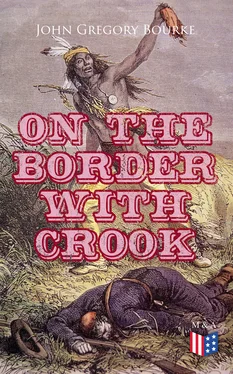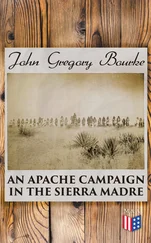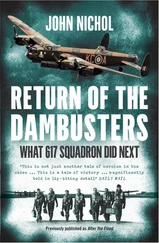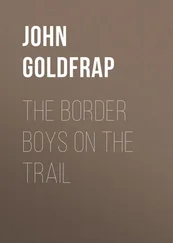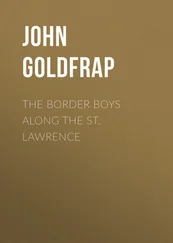1 ...7 8 9 11 12 13 ...31 In Arizona, New Mexico, and southwestern Texas it has been remarked that one has to ascend the bed of a stream in order to get water. This rule is especially true of the Aravaypa. There is not a drop, as a usual thing, at its mouth, but if you ascend the cañon five or six miles, the current trickles above the sand, and a mile or two more will bring you to a stream of very respectable dimensions, flowing over rocky boulders of good size, between towering walls which screen from the sun, and amid scenery which is picturesque, romantic, and awe-inspiring. The raiders left the cañon of the Aravaypa at its most precipitous part, not far from the gypsum out-crop, and made a straight shoot for the mouth of the San Carlos. This, however, was only a blind, and inside of three miles there was no trail left, certainly not going in the direction of Mount Turnbull.
Manuel Duran was not at all worried; he was an Apache himself, and none of the tricks of the trade had the slightest effect upon his equanimity. He looked over the ground carefully. Ah! here is a stone which has been overturned in its place, and here some one has cut that branch of mesquite; and here—look! we have it, the shod-hoof track of one of Israel’s mules! There is nothing the matter at all. The Apaches have merely scattered and turned, and instead of going toward the junction of the Gila and the San Carlos, have bent to the west and started straight for the mouth of the San Pedro, going down by the head of Deer Creek, and over to the Rock Creek, which rises in the “Dos Narices” Mountain, not twelve miles from Grant itself. Patient search, watching every blade of grass, every stone or bush, and marching constantly, took the command to the mouth of the San Pedro, across the Gila, up to the head of the Disappointment Creek, in the Mescal Mountains, and over into the foot-hills of the Pinal—and not into the foot-hills merely, but right across the range at its highest point.
The Apaches were evidently a trifle nervous, and wanted to make as big a circuit as possible to bewilder pursuers; but all their dodges were vain. From the top of the Pinal a smoke was detected rising in the valley to the north and east, and shortly afterward the evidence that a party of squaws and children, laden with steamed mescal, had joined the raiders, and no doubt were to remain with them until they got home, if they were not already home.
Cushing would hardly wait till the sun had hidden behind the Superstition Mountains or the Matitzal before he gave the order to move on. Manuel was more prudent, and not inclined to risk anything by undue haste.
He would wait all night before he would risk disappointment in an attack upon an enemy whom he had followed so far. Manuel wouldn’t allow any of the Americans, to come near while he made his preparations for peeping over the crest of the “divide.” Tying a large wisp of palmilla or bear’s grass about his head, he crawled or wriggled on hands and knees to the position giving the best view down the valley, and made all the observations desired.
The night was long and cold and dark, and the men had been at least an hour in position overlooking the smouldering fires of the enemy, and ready to begin the attack the moment that it should be light enough to see one’s hand in front of him, when an accidental occurrence precipitated an engagement.
One of the old men—one of the party of mescal gatherers who had joined the returning war-party—felt cold and arose from his couch to stir the embers into a blaze. The light played fitfully upon his sharp features and gaunt form, disclosing every muscle.
To get some additional fuel, he advanced toward the spot where Cushing crouched down awaiting the favorable moment for giving the signal to fire. The savage suspects something, peers ahead a little, and is satisfied that there is danger close by. He turns to escape, crying out that the Americans have come, and awakening all in the camp.
The soldiers raised a terrific yell and poured in a volley which laid low a number of the Apaches; the latter scarcely tried to fight in the place where they stood, as the light of the fire made their presence perfectly plain to the attacking party. So their first idea was to seek a shelter in the rocks from which to pick off the advancing skirmishers. In this they were unsuccessful, and death and ruin rained down upon them. They made the best fight they could, but they could do nothing. Manuel saw something curious rushing past him in the gloom. He brought rifle to shoulder and fired, and, as it turned out, killed two at one shot—a great strong warrior, and the little boy of five or six years old whom he had seized, and was trying to hurry to a place of safety, perched upon his shoulders.
It was a ghastly spectacle, a field of blood won with but slight loss to ourselves. But I do not care to dilate upon the scene, as it is my intention to give only a meagre outline description of what Arizona was like prior to the assignment of General Crook to the command. The captured women and boys stated they were a band of Pinals who had just returned from a raid down into Sonora before making the attack upon the wagons of Kennedy and Israel. Some of their bravest warriors were along, and they would have made a determined fight had they not all been more or less under the influence of the stuff they had swallowed out of the bottles captured with the train. Many had been very drunk, and all had been sickened, and were not in condition to look out for surprise as they ordinarily did. They had thought that by doubling across the country from point to point, any Americans who might try to follow would surely be put off the scent; they did not know that there were Apaches with the soldiers.
Table of Contents
THE RETURN TO CAMP GRANT—LANCED TO DEATH BY APACHES—THE KILLING OF MILLER AND TAPPAN—COMPANY QUARTERS—APACHE CAPTIVES—THE CLOUD-BURST—APACHE CORN-FIELDS—MEETING COLONEL SANFORD—ENTRAPPED IN AN APACHE AMBUSCADE—AN OLD-TIMER’S REMINISCENCES OF TUCSON—FUNERAL CROSSES ON THE ROADSIDE—PADRE EUSEBIO KINO—FIRST VIEW OF TUCSON—THE “SHOO FLY” RESTAURANT.
OF the return march very little need be said. The story would become too long, and there would be needless repetition if an attempt were to be made to describe each scout in detail. There are others to come of much more importance, and covering the same region, so that the reader will lose nothing by the omission.
There was the usual amount of rough mountain climbing, wearing out shoes and patience and nerve strength all at one and the same time; there was the usual deprivation of water to be expected in the arid wastes of southern Arizona, where springs are few and far between; there were the usual tricks for getting along without much to drink, such as putting a pebble or twig in the mouth to induce a more copious flow of saliva; and when camp was made and the water was found to be not all that it might be, there were other tricks for cleaning it, or, at least, causing a deposition of the earthy matter held in suspension, by cutting up a few plates of the nopal and letting them remain in the kettle for a short time, until their mucilaginous juice had precipitated everything. But a still better plan was to improve the good springs, which was a labor of love with officers and men, and many a fine water hole in Arizona has been the scene of much hard work in digging out, building up with cracker boxes or something to hold the water and keep it from soaking into the earth.
Camp Grant was reached at last, and the prisoners turned over to the care of the guard, and Lieutenant Cushing, his first duty in the Territory accomplished with so much credit to himself and his men, made ready to start out on another and a longer trip just as soon as the signal should be given by the post commander.
Читать дальше
